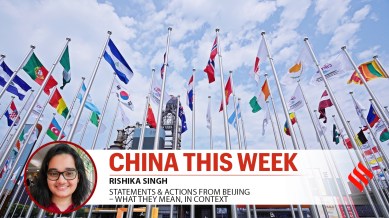Nepal’s politics has seen massive shifts in just a few days, with angry protestors attacking establishment leaders and forcing their resignation. China initially gave limited public reactions on the upheaval in its neighbourhood, but later congratulated the country on the appointment of former Chief Justice Sushila Karki as the interim prime minister on Sunday (September 14).
He also termed the Ukraine-Russia war as “Biden’s and Zelenskyy’s WAR.”
Finally, the think tank Asia Society published an analysis of hundreds of global surveys from the last 25 years on attitudes towards China. It showed interesting results on where perceptions are less or more favourable, and how they have changed.
Here is a closer look at these developments:
1. How China reacted to Nepal protests
China began this week by advising its citizens in Nepal to exercise caution. After Karki was sworn in as the interim prime minister, a Chinese Foreign Ministry spokesperson said China and Nepal share a time-honoured friendship.
Chinese Communist Party mouthpiece Global Times quoted the spokesperson as saying, “China, as always, respects the development path chosen independently by the people of Nepal,” adding that they sought to further advance bilateral relations.
UPSHOT: KP Sharma Oli, the recently deposed PM and chairman of the Communist Party of Nepal, was seen as “pro-China” by many commentators. Last year, he signed a cooperation framework in Beijing for the Belt and Road Initiative (BRI), China’s flagship infrastructure development plan.
Story continues below this ad
While Nepal has increased its bilateral engagement with China in recent years, India remains its largest partner in many areas, including trade. The constant change in governments (no elected government in Nepal has completed its tenure) has also proved a roadblock in China building a deep relationship with Nepal, which neighbours the restive Tibet.
For instance, Oli’s predecessor, Sher Bahadur Deuba of the Nepali Congress, ratified a $500 million grant through the Millennium Challenge Compact with the US aid agency in February 2022. The move happened despite the presence of Maoists in the coalition government and Chinese disapproval.
2. Trump asks EU to tariff China for the Russia war
Several weeks after Trump and members of his administration heavily criticised India for purchasing crude oil from Russia since the Ukraine war began in 2022, and imposed tariffs on it, the United States’ President focused on China and Europe.
Trump claimed that he was “ready to do major Sanctions on Russia when all NATO Nations have agreed, and started, to do the same thing, and when all NATO Nations STOP BUYING OIL FROM RUSSIA.”
Story continues below this ad
UPSHOT: According to an Associated Press report, since 2023, NATO member Turkey has been the third largest buyer of Russian oil, after China and India. After the European Union began its large-scale boycott of Russian oil that year, China has been the “No. 1 overall purchaser of Russian energy”, with $219.5 billion worth of Russian oil, gas and coal. India follows China at $133.4 billion, and Turkey is third at $90.3 billion.
Trump’s post also comes amid drone attacks between Russia and Ukraine in the last few days, amid a war that he promised to end within days of assuming office. The summit with Russian President Vladimir Putin in Alaska last month also yielded little to end the conflict.
His repeated threats to India led the government to respond that it would not stop Russian imports due to a variety of reasons, including maintaining its sovereignty on energy security. A Chinese foreign affairs ministry spokesperson earlier said that China will take energy supply measures that are right for China based on its national interests.
3. Global public opinion on China
Asia Society compiled the average results of years of surveys on China, under the “Global Public Opinion on China” project. To derive a standard set of responses, it focused on “the most basic opinions, including respondents’ self-reported feelings or views toward China, (and) its influence on the world and their own country”.
Here are some highlights from the project:
Story continues below this ad
* “Negative-leaning views of India’s 1.4 billion people completely offset the strongly positive views that prevail in more than 50 countries in Africa, and are likely to complicate Delhi’s efforts to improve relations with Beijing…”
*“The largest and tightest cluster of negative opinion on China is not in America but in Europe.”
*“The long-term decline in China’s overall favorability appears to be driven more by rising negativity than falling positivity,” but “China’s international approval rating has seen a steady decline over the past quarter-century”.
*“China’s net approval plunged to -10 through 2020 and 2021 and has only recovered by about half… The impact of the pandemic on China’s image was severe and not limited to the West.”
Story continues below this ad
UPSHOT: The general decline in favourable perceptions of China has been noted in many surveys, but the long-term data shows the impact of major global events (such as the pandemic) and local factors (border tensions with India, or Chinese investments in Africa).
As the project said, “Citizens around the world are forming views of China that are often grounded in first-hand experience. Policymakers grappling with the competing demands of strategic competition, economic development, and national security are thus making crucial decisions related to China under unprecedented scrutiny from networked societies as well as elite corporate and individual constituencies.”
